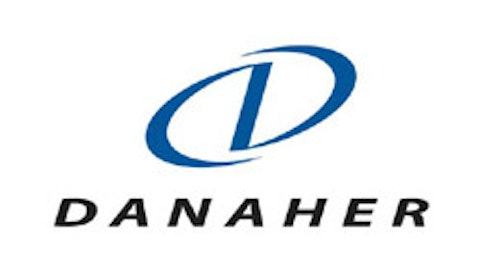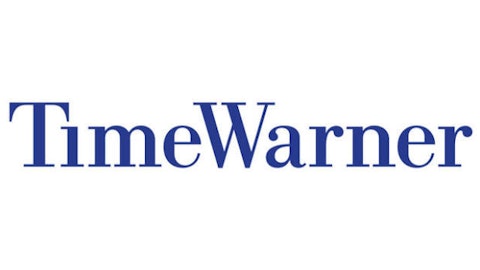The numbers
At just 14.5 times the current fiscal year’s expected earnings, Stanley Black & Decker is a very attractive investment. 2013’s expected earnings of $5.44 per share are projected to rise to $6.27 and $6.95 in 2014 and 2015 as a result of the combination of the higher margins mentioned above and increased infrastructure spending, particularly in emerging markets. This corresponds to a three-year average annual forward earnings growth rate of 14.2%, which is excellent for any business, especially one with such a low P/E. Let’s see if this is unique to the company, or if deals like this are found all across the sector.
Alternatives: Danaher Corporation (NYSE:DHR) and Makita Corporation (ADR) (NASDAQ:MKTAY)
Danaher Corporation (NYSE:DHR) is a much larger company, about four times the size of Stanley Black & Decker in terms of market cap. Danaher Corporation (NYSE:DHR) makes tools and process controls for a wide range of industries, including for communications businesses, life sciences, dental applications, as well as for general industrial purposes.
Although Danaher Corporation (NYSE:DHR) is projected to have very strong growth over the next several years (about 11% annual earnings growth), the stock trades at a higher P/E of 18.4 times earnings. While this does sound reasonable, it is nowhere near as attractive as Stanley Black & Decker’s valuation. Also worth noting is that Danaher Corporation (NYSE:DHR) pays a very small (0.16%) dividend yield, which Stanley B&D pays about 2.5% annually, which is sure to attract some income-seekers.
Makita Corporation (ADR) (NASDAQ:MKTAY) is a much more well-known among casual investors as a manufacturer of power tools such as drills, sanders, and rotary hammers. One interesting fact about Makita Corporation (ADR) (NASDAQ:MKTAY) is that is has quite possibly the most attractive financial position of these three companies, with over $1.2 billion in cash and virtually no long-term debt. However, Makita pays no dividend and trades at the highest valuation of the group (23.7 times earnings). It currently is trading at all-time highs, presumably due to the anticipated increase in construction spending that will come if the economic recovery continues.
Buy, sell, or hold?
Stanley Black & Decker looks to be very attractively valued and has not experienced the huge gains that the other two have in the recent past. It is the highest dividend payer, and since the Black & Decker merger has almost doubled its dividend and has reduced the amount of outstanding shares by 5% over the past two years through repurchases. If you think that the economic recovery will succeed (as I do), any company that makes quality products used in construction and infrastructure is sure to benefit, and Stanley Black & Decker is a very attractive way to play it.
Caterpillar is the market share leader in an industry in which size matters, and its quality products, extensive service network, and unparalleled brand strength combine to give it solid competitive advantages.
The article A Cheap Tool Manufacturer With Ambitious Growth originally appeared on Fool.com.
Matthew Frankel has no position in any stocks mentioned. The Motley Fool has no position in any of the stocks mentioned. Matthew is a member of The Motley Fool Blog Network — entries represent the personal opinion of the blogger and are not formally edited.
Copyright © 1995 – 2013 The Motley Fool, LLC. All rights reserved. The Motley Fool has a disclosure policy.





